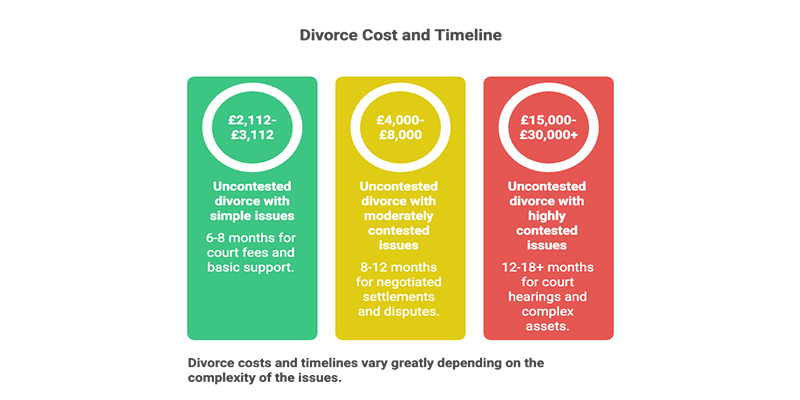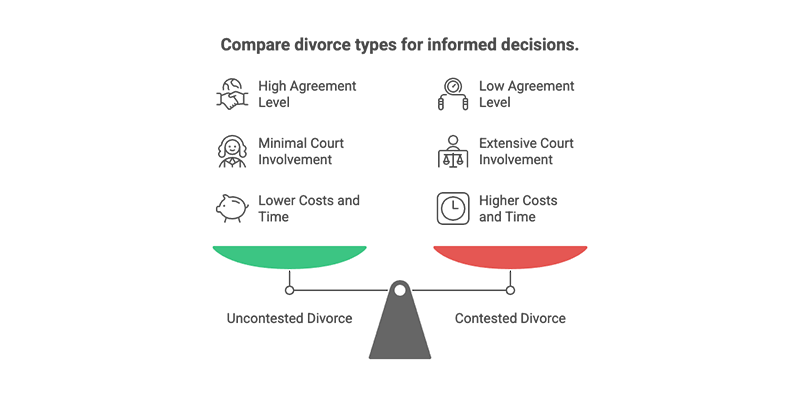The question of “how much does a divorce cost in the UK” has no simple answer because divorce cost varies dramatically from case to case. The fees involved depend heavily on multiple factors, and, without clear information about what you’ll actually pay, financial uncertainty adds stress to an already difficult situation.
The cost of divorce in the UK, therefore, isn’t one-size-fits-all. Some couples will spend under £2,000 and complete the process in six months, whilst others face bills far exceeding £30,000, taking years of legal proceedings to resolve. Understanding how much a divorce costs before you begin helps you budget appropriately and make informed decisions about legal representation.
This guide explains UK divorce fees in detail, covering everything from mandatory court fees to solicitor charges. You will learn the real difference between contested and uncontested divorce, and how that affects costings, discover whether the amount of time you’re separated has an impact, and find practical strategies for keeping these costs manageable without compromising your legal rights.
Quick Answer: Typical UK Divorce Costs
The cost of your divorce depends primarily on whether you can reach agreement with your spouse, how complex your financial situation is, and at what stage you involve solicitors. Whilst you cannot contest the divorce itself under the no-fault system introduced in 2022, disputes over financial settlements and child arrangements or even injunctions can often arise alongside the divorce itself and form part of the issues to be resolved.
In this respect, they are often seen as part of the divorce costs and can dramatically increase the overall expense.
Geography also plays an important role, with London-based solicitors typically charging significantly more than those in other regions.
For a straightforward divorce where both parties agree to the split and cooperate on financial and child arrangements, you can expect to pay between £2,112 and £3,112 in total. This will include the mandatory court fee of £612 as well as solicitor fees ranging from between £1,500 – £2,500 plus VAT.
However, costs can escalate dramatically if your divorce is contested, or involves any complex financial arrangements, such as:
- Ownership of a business or professional practice.
- Multiple properties or overseas assets.
- Complex pension arrangements.
- Trusts or inherited wealth.
- Hidden or disputed assets.
- Debts and liabilities requiring detailed investigation.
The actual cost for such a divorce will vary greatly depending on the level of complexity and the amount of conflict involved in the process.
Understanding these factors from the outset helps you budget appropriately and make informed decisions about how to proceed.
Understanding the Different Costs of Divorce
Divorce can be both emotionally and financially draining, and one of the main concerns people stress over is how much the process will actually cost. The divorce costs uk couples face varies significantly based on individual circumstances, making it essential to understand each component.
Many people searching for information about “how much does a divorce cost” or looking for information on divorce fees in the UK need a detailed breakdown to plan effectively. To give you a clearer picture of divorce prices and what drives costs up or down, we break down the main types of divorce costs, from court fees and solicitor charges to other potential expenses that arise in more complex situations.
Court Fees for Divorce
In 2025, the court fee to file for divorce in England and Wales is £612. This mandatory fee is paid directly to HM Courts and Tribunals Service and covers the processing of your divorce petition, issuance of the conditional order (previously known as a decree nisi), and the granting of the final order (previously a decree absolute). This single payment covers the entire administrative process of legally dissolving your marriage through the legal system.
It’s important to note that this court fee applies whether you instruct a solicitor or handle the divorce yourself. This cost cannot be avoided through any legal means, though you can qualify for fee exemption or reduction if you are receiving certain benefits or have limited income/savings.
The application process for fee exemption is relatively straightforward and involves the completion of form EX160, which can be obtained directly from the court or downloaded from the government website.
It’s important to note that this £612 only represents standard court fees. Should you need to apply for additional court orders, such as financial orders or regarding contested child arrangements, you’ll face additional court fees.
Solicitor Fees for Divorce
Solicitor legal costs will vary dramatically based on your individual situation and the requirements of your case. For an uncontested divorce with simple other issues to resolve, solicitors’ costs can typically range from £1,500 to £2,500 (plus VAT). Where there are no other issues to resolve you can expect to pay around £500 plus VAT along with the court fee for a simple divorce.
Within this initial cost for more straightforward cases, the process usually includes:
- Paperwork preparation.
- Correspondence with your spouse or with their solicitor(s).
- Communication with the court.
- Advice throughout the process.
Disputed divorces, on the other hand, present a very different picture. If one or both parties dispute the financial settlement or child arrangements, legal fees will escalate and can range from £5,000 to £30,000 — or even more in highly complex cases.
Solicitors will also typically charge more depending on their location, experience levels, and the prestige of their firm. For example, London solicitors at top firms may charge higher rates than those in Northern England or Wales for the same service.
Additional Potential Divorce Expenses
Beyond basic court and solicitors fees, you might also encounter some additional expenses throughout the divorce process, including:
- Mediation: Mandatory before making certain court applications regarding finances and children since 2014. Mediation fees typically range from £100 to £150 per hour per party. It is possible to be exempt from needing to undergo mediation, for example if domestic violence has occurred.
- Court Hearings: If your case did proceed to court hearings, additional fees would apply for each hearing. This may include paying a barrister to conduct the hearing on your behalf.
- Expert Witness: The services of an expert witness may be required for complex financial cases where valuations are required.
- Pensions: Pension Sharing Orders can require specialist advice to ensure you receive a fair settlement — taking into account this valuable asset.
- Valuation Experts: In complex cases, you may need to hire independent experts to value assets such as a family business, property portfolio, or high-value items like art and jewellery.
- Financial and Tax Advisers: Specialist accountants or tax advisers are often crucial for untangling complex finances, understanding the tax implications of a settlement, and ensuring long-term financial planning.
- International Legal Costs: Cases involving international assets or spouses may require foreign legal counsel, translation services, and interpreters, adding significant cost and complexity.
- Additional Application Fees: Additional court fees are payable if you make applications for child arrangement orders or financial remedy orders. These are separate from the divorce application fee and will add to your overall costs.
Uncontested Divorce Cost vs Contested Divorce
The fundamental difference between a cooperative divorce and a disputed one is a key aspect in determining how much your divorce could cost. Whilst the no-fault divorce system means you cannot easily contest the divorce itself, disputes over finances and children arrangements — what many people still refer to as a “contested divorce” — create dramatically different cost outcomes.
A cooperative divorce (sometimes called uncontested) occurs when both parties can reach agreement on financial matters and child arrangements without court intervention. The financial settlement has been agreed or there are no significant assets to divide, child arrangements have been settled if applicable, and both parties are willing to cooperate with paperwork and court requirements.
While both parties want to dissolve the marriage efficiently and work cooperatively, solicitors will still need to review the necessary evidence and documentation, and in some cases substantial enquiry and due diligence is still required to ensure a fair outcome. The key difference from a disputed divorce is avoiding contested court hearings and protracted litigation.
Barring any unexpected complications, and if both parties respond promptly to all information or document requests, the timeframe necessary to complete a cooperative divorce will typically run between six and eight months from filing to final order.
Disputed divorces present a very different scenario. Common causes of disputes that drive up costs include:
- Disagreements regarding the financial settlement.
- Child arrangement disputes.
- One party refusing to engage with the process or deliberately obstructing it.
- The presence of complex asset portfolios — including business interests, multiple properties, or international assets.
While the same divorce application fee of £612 applies, separate court fees are payable for applications concerning financial remedy orders and child arrangement orders. Additional hearing fees are also charged for each court attendance when these disputes require court resolution. Solicitor fees will become much higher as a result of the extensive additional time required in court, the detailed preparation of evidence, and any witness statements required.
The typical timeframe to resolve divorces with disputed arrangements is between nine and fifteen months, or even longer, during which legal fees will continue to accumulate. As a result, divorce costs can easily reach tens of thousands for highly complex cases.
No-Fault Divorce Costs in the UK
In April 2022, England and Wales introduced no-fault divorce, fundamentally changing how couples can end their marriage. The good news is that no-fault divorce didn’t increase costs — in many cases, it has actually reduced them.
The court fee for a no-fault divorce is now £612, up from the previous system. There are no additional charges for using the no-fault route, and you don’t need to pay more to avoid citing specific reasons for the marriage breakdown. The key difference is that you no longer need to prove fault, adultery, desertion, or years of separation. You simply need to state that the marriage has broken down irretrievably.
Where no-fault divorce can reduce costs is in solicitor fees and overall conflict levels. Under the old system, couples could spend thousands of pounds on legal fees preparing evidence of unreasonable behaviour or adultery, which frequently escalated tensions and led to more contested proceedings. No-fault divorce removes this adversarial element, making it easier for couples to cooperate and keep costs down. Solicitor fees for the divorce process itself are typically around £500 plus VAT, alongside the £612 court fee. For uncontested divorces with simple other issues to resolve (such as straightforward financial settlements or child arrangements), fees typically range from £1,500 to £2,500 plus VAT.
The no-fault divorce process requires a minimum 20-week reflection period from when the application is issued to when you can apply for the conditional order, followed by a further six weeks before the final order can be granted. This means the fastest possible divorce takes approximately six and a half months. Whilst you cannot pay to speed up this minimum timeframe, the reduced conflict often means cases progress more smoothly through each stage without delays caused by disputes over grounds.
DIY Divorce: How Much Does a Divorce Cost Without a Solicitor?
It is possible to handle a divorce without a solicitor, commonly referred to as a DIY divorce. The reason most consider DIY divorces is to keep the cost down. In this scenario, you’re only paying the mandatory court fees of £612.
DIY divorce only works if specific conditions can be met. This includes:
- Both parties must agree to the divorce 100% and be willing to cooperate fully throughout the process. This includes responding to requests both promptly and accurately.
- There should ideally be no children. If there are children, child arrangements must be fully agreed.
- The couple should have limited to no significant assets to divide. The division of any assets you do have should be done by mutual agreement and be a case where it is safe for there to be no clean break provision in an order. This prevents either party from making future claims. This point can be challenging to determine.
- You must be comfortable with accurately and thoroughly completing legal paperwork.
Despite the financial savings, DIY divorce carries several key risks that must be carefully considered. Crucially, any mistakes in the paperwork will cause delays to the process, at best, and total rejection of your application at worst. This would force you to have to start the process again. Without legal advice, you may not fully understand your financial rights or what you’re entitled to claim. This could potentially cost you far more than solicitors fees would have, as valuable assets like pensions are often undervalued or even omitted completely by non-experts.
Important legal protections surrounding settlements and future claims can also be missed if you don’t fully understand the process.
Our strong recommendation is that, even for amicable divorces, you should always undertake an initial consultation. This allows you to better understand your rights, learn what you should be entitled to in your financial settlement, and ensure you’re not proceeding with an unfair settlement out of ignorance or a desire to avoid conflict. An initial investment in experienced professional advice could save you thousands in the long run if it prevents you from agreeing to an unfair settlement or missing important protections that could safeguard your financial future.
Online Divorce Services: Costs and What to Expect
Online divorce services have become an increasingly popular choice as a middle ground between fully DIY divorce and a traditional solicitor service. Costs for online divorce services will often range from £150 to £500 plus the £612 court fee.
Essentially, online divorce services are managed DIY divorces, where you are provided with the correct forms and guided through the process by a qualified solicitor. Your paperwork will likely also be checked for errors, and submission will be handled on your behalf.
Online divorce services can work well in specific circumstances. They are ideal for any straightforward, uncontested divorces, where both parties agree to the split, there are no complex financial arrangements that need resolving, and child arrangements either do not factor or are pre-agreed. However, this format does come with significant limitations that you should understand before committing your time and money.
Online divorce services typically don’t provide legal advice about your financial settlement. This could result in missing out on high-value assets or a lack of protection. An online divorce solicitor also won’t be able to negotiate on your behalf should a disagreement arise during the process, and they will not represent you should your spouse have a change of heart and look to contest the divorce or financial agreement. Most importantly, the financial settlement you reach with your spouse won’t be legally binding without a consent order, which these services won’t include as-standard.
How to Reduce the Cost of Your Divorce
Even during a difficult and emotionally charged time, there are still steps you can take to minimise divorce expenses without compromising your legal rights or financial future. These strategies require some discipline and clear thinking, but they can save you thousands of pounds whilst still achieving a fair outcome. The key is understanding where costs accumulate and making informed choices about which services you truly need versus which represent unnecessary expenses.
- Consider Mediation: Mediation typically costs between £1,000 and £2,000 for both parties, but could save significantly more in legal fees by helping you reach agreement without lengthy court battles. A neutral third party can help facilitate discussions between you and your spouse, helping you work together to find mutually acceptable solutions.
- Be Organised: It’s important to gather all financial documents before solicitors’ meetings, so they don’t need to spend billable time requesting them. Respond to all requests promptly to avoid additional unnecessary correspondence and reminder letters.
- Use Fixed-Fee Services: Many firms now offer fixed-fee divorce packages for uncontested cases. This flat fee will cover standard paperwork and court correspondence without any chance of surprise bills. This allows you to budget accurately while removing the anxiety of watching costs mount unpredictably.
- Put Kids First: Child arrangements (when there are any to be made) and financial remedies are two of the biggest, most emotionally-charged elements that could take the longest to agree, and as a result cost the most. The courts also consider these the biggest priorities. Getting your affairs in order in this area could, as a result, keep costs down.
- Keep Emotions Separate: It’s important that you use your solicitor exclusively for legal strategy and advice only. If you do feel you need emotional support, contact a specialist counsellor or therapist and save substantial amounts whilst getting the level of emotional support you need.
- Agree on Finances First: Financial disputes can represent one of the biggest cost drivers in a divorce case. Maintain open conversations about fair division of assets, consider the needs of both parties, and be willing to compromise on items that are not fundamental to your future. Doing so in advance of beginning proceedings can help you reach agreement far quicker, for substantially less.
Getting Divorced on Benefits or Low Income
If you find yourself worried about affording a divorce due to limited income or savings, there are options available to help make the process more financially manageable. The most important first step is to apply for court fee exemption, which can cut out the £612 court fee entirely for anybody who qualifies. Qualification for exemption requires that one of the following applies:
- You receive certain qualifying benefits.
- Your monthly income falls below the threshold amount.
- You have limited savings, below a specified limit.
Legal aid for divorce is generally limited in England and Wales, having been largely removed for divorce proceedings in 2013. However, you may still qualify in specific circumstances. Cases involving domestic abuse, where you can provide adequate evidence, may qualify, as may scenarios where a risk of child abduction exists, or situations of forced marriage. You will be expected to provide evidence of prior abuse or risk, such as:
- Police reports.
- Medical evidence.
- Refuge admission records or correspondence.
- Court orders.
If available, legal aid covers solicitors fees, court costs, and expert fees, ensuring divorce is financially viable for those who would not otherwise be able to afford it and are most in need of the support.
If you don’t qualify for either court fee exemption or legal aid, there are several low-cost legal options still available to you, including:
- Law Centres/Legal Advice Charities: Often provide free initial consultations. Some may also offer reduced-fee services for ongoing work.
- Pro-bono Clinics: Staffed by volunteer solicitors who are willing to offer free legal advice, though typically only for limited time and for specific issues rather than providing full support.
- Citizens Advice: Provides free general advice on the divorce process to help people understand what needs to be done. Citizens Advice cannot represent you in court though so support beyond that would require additional expertise.
The True Cost of Divorce: Beyond Legal Fees
Whilst this guide focuses primarily on legal costs associated with the divorce process itself, it’s worth acknowledging that divorce has substantial financial impact beyond the court and solicitors fees. Understanding these broader implications can help you plan more effectively for life after divorce.
An immediate cost to consider includes setting up separate households if you’ve been living together. Finances involved include money for:
- Deposits
- Furniture
- Household essentials
- Moving expense
- Emergency accommodation if you need to leave quickly.
Ongoing financial changes also often prove significant. Both parties will now need to contribute 100% to utilities, council tax, broadband, etc. as opposed to before when they would have been expected to contribute less.
Child maintenance payments will also represent an ongoing obligation for the non-resident parent. This will often last until children complete education.
Many people significantly underestimate the total financial impact of divorce, focusing on the immediate legal costs without considering how their overall financial situation will change post-divorce. Speaking with a financial advisor who’s separate from your solicitor can provide valuable perspective on planning for post-divorce financial life, helping you make informed decisions during settlement negotiations about what assets and arrangements will best support your future.
Frequently Asked Questions About Divorce Costs
Does Divorce Cost Less if Both Parties Agree?
If both parties agree to the divorce and cooperate throughout the process, with no other issues to resolve, you can expect to pay around £1,112 total. This includes the £612 court fee and approximately £500 plus VAT in solicitor fees for a simple divorce.
Where there are simple other issues to resolve (such as straightforward financial settlements or child arrangements), costs typically range from £2,412 to £3,612, including the court fee and solicitor fees of £1,500-£2,500 plus VAT.
Who pays divorce costs in the UK?
Typically, the person who starts the divorce (the petitioner) is responsible for paying the initial court fee. However, this is just a default position, and many couples agree to split this cost, especially in amicable separations. Beyond the court fee, each party almost always pays for their own solicitor’s fees, regardless of who filed for divorce.
For an uncontested divorce with simple other issues to resolve, each person’s legal fees are typically between £1,500 and £2,500 plus VAT. For a simple divorce with no other issues to resolve, fees are usually around £500 plus VAT per person. The court rarely orders one party to pay the other’s legal costs, usually only doing so in cases of unreasonable behaviour or a significant financial imbalance.\
Does it Matter Who Files for Divorce First in the UK?
In terms of cost, it doesn’t usually matter who files first. The petitioner pays the initial court fee, but this can be negotiated between parties. Since the introduction of no-fault divorce in 2022, there’s even less significance to who files first, as neither party needs to prove fault. The main difference is that the petitioner controls the initial timeline and paperwork.
What is the Cheapest Way to Get a Divorce in the UK?
The cheapest way to get a divorce is to handle it yourself (DIY divorce) without a solicitor, which costs just £612 for the court fee. However, this only works if both parties fully agree, there are no complex finances or children arrangements to resolve, and you’re comfortable completing legal paperwork accurately. Remember that if a court order is needed for children or finances, separate fees are payable to the court in addition to the divorce application fee. Even for simple cases, getting initial legal advice is strongly recommended to ensure you understand your basic rights.
Is the cost of divorce after 2 year separation different?
The court fee is currently £612, though the government reviews court fees annually so this may change. Delaying proceedings can indirectly increase costs. Over two years, financial situations often become more complex with new assets, separate accounts, and changed living arrangements. Untangling this more complicated financial web requires more legal work during the settlement negotiations. If disagreements arise over these new assets, the increased negotiation or conflict can significantly raise solicitor fees, making the divorce more expensive than if it had been finalised sooner.
How much does a divorce cost after 5 years
The five-year mark no longer holds a special legal status for granting the divorce itself. Since April 2022, all applications are no-fault, and a separation period does not replace a spouse’s consent. The cost is still primarily driven by the £612 divorce application fee and solicitor costs for the financial settlement. While the long separation might provide clarity and reduce conflict, potentially lowering costs, a complex or contested financial settlement — which is legally separate from the divorce application — will still be the main factor that causes costs to escalate.
How Long Does a Divorce Take in the UK?
A divorce in England and Wales has a mandatory legal timeline that cannot be shortened. The fastest possible divorce takes a minimum of 26 weeks (just over six months). This consists of a 20 week reflection period after the application is issued, followed by a minimum six week wait before the divorce can be finalised. For a straightforward divorce where both parties cooperate, the entire process typically takes six to eight months. If there are delays in cooperation, it can take twelve to eighteen months, or sometimes even longer.
Can I Pay More to Get a Quicker Divorce?
No, you cannot pay more to speed up a divorce. The court’s mandatory timeline is fixed by law and applies to everyone, regardless of whether you use a premium solicitor or handle the application yourself. While you can pay for a more responsive and efficient solicitor to ensure your paperwork is processed without delay on your end, this does not affect the court’s minimum 26-week processing period. Any service advertising a “quick divorce” that bypasses this timeline is misleading, as these legal timeframes cannot be shortened except for in extremely limited circumstances.
Need Help With Your Divorce?
The financial decisions you make during your divorce, particularly regarding costs and settlements, will have a lasting impact on your future. Understanding your options and securing transparent, reliable legal support is essential to navigating this process confidently and without unexpected financial strain.
At WHN Solicitors, our family law team provides clear guidance and robust representation to ensure you achieve a fair outcome. We offer transparent, fixed-fee services to give you certainty and peace of mind, allowing you to focus on the path ahead. Recognised for our expertise and trusted by clients across the North West and beyond, we are committed to safeguarding your interests with practical, tailored advice.
To discuss your situation and receive a clear estimate of costs, please contact us today.
- Email: davidconnor@whnsolicitors.co.uk
- Call: 01706 232039
Disclaimer: This guide provides general information about divorce costs in England and Wales. For legal advice tailored to your specific circumstances, please contact our team to arrange a consultation.

























